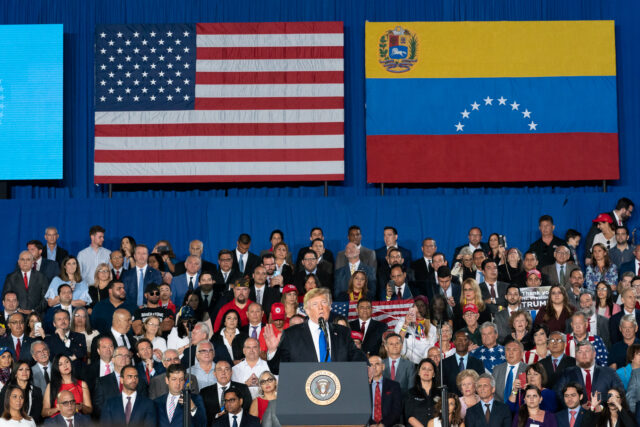 President Trump delivers remarks to the Venezuelan American community in Miami, Florida, 2019. (Official White House Photo by Andrea Hanks)
President Trump delivers remarks to the Venezuelan American community in Miami, Florida, 2019. (Official White House Photo by Andrea Hanks)
The Trump Administration could be the most engaged with Latin America of any 21st-century administration. Here’s why that is a good thing.
Never in recent history has the Cabinet of the United States been led by as many Latin America experts as the Trump administration plans to appoint. At a time when foreign policy has its eyes laser-focused on the Middle East and Ukraine, strategic realignment with U.S. neighboring allies could open the United States up to a new source of security and economic prosperity. With collaboration between Latin America and China growing by year, greater focus on the region should be a priority of the Trump administration and those that follow.
Latin America has been at the bottom of the U.S. foreign policy priority list for far too long. Administrations have promised greater cooperation with the region for decades, but large-scale foreign crises have often taken attention off foreign policy in the Western Hemisphere. Disproportionate U.S. focus on the Middle East, Asia, and Ukraine, has allowed China to establish a firm collaborative footing in Latin America, coinciding with the growth of Russian security and economic cooperation in the region during the same period.
Trump’s recent appointments of Marco Rubio to head the State Department, ex-U.S. Ambassador to Mexico Christopher Landau as Deputy Secretary, and Mike Waltz as National Security Advisor reflect a new era of foreign policy that will be focusing on the Western Hemisphere. His administration has also nominated several Ambassadors to key Latin American nations such as Colombia and the Dominican Republic, which were without Ambassadors for years. President Trump also maintains close personal relationships with Brazilian former President Jair Bolsonaro and Salvadorean President Nayib Bukele. Argentine President Javier Milei was the first foreign leader to visit Trump after the election in November.
If the United States wants to maintain its position as the “global protector,” it needs to prove that it can defend its interests in its own backyard. In the past 25 years, China has gone from making up 2 percent of Latin American exports to now being the largest export destination for South America and the second largest in all Latin America. In 2021, the trade volume between China and Latin America exceeded $450B, with many expecting that number to rise to $700B in the next ten years. In contrast, in 2023, trade volume between the United States and Latin America amounted to about $1.1T. However, when trade with Mexico is removed, the number shrinks to less than $350B.
As part of the Belt and Road Initiative, China has invested over $100B in Latin America’s energy, infrastructure, and mining sectors. This includes the development of Chinese mining companies to operate in Latin America and the construction of Chinese cellular communications infrastructure and facial recognition software for policing. Beyond that, between 2018 and 2020, China invested an additional $16B in Latin America’s “Lithium Triangle,” a region holding 56 percent of the world’s lithium. When countries are unable to repay their debt to China, they are allowed to pay it back with natural resources; this debt trap advantages weaker nations and strengthens Chinese supply chain dominance.
Beyond its underutilized markets and resources, Latin America has the potential to play a role in broader U.S. foreign policy. One critical policy issue for Washington is Taiwan, which is losing its global diplomatic recognition quicker than it is gaining it. Of the eleven UN member states that have official relations with Taiwan, seven are in the Americas. Of those seven, one is in South America (Paraguay) and two are in Central America (Guatemala and Belize). The remaining four are scattered across the Caribbean. However, even this foothold is in jeopardy. In March 2023, Honduras severed ties with the island in exchange for establishing relations with China, a move known as “dollar diplomacy.”
Unlike when seeking foreign investment from the United States or U.S.-based companies, countries seeking money from China do not have to meet requirements of democracy or human rights, explaining the strong relationship between China, Venezuela, Nicaragua, and Cuba. While being authoritarian or negligent of human rights abuses is not a requirement to work with China, it allows those governments a pathway to economic success without needing to conform to the norms of the international community. It is possible that President Trump can use his relations with autocratic figures in Latin America to sway the greater region away from Chinese predatory influence.
If the United States does not strengthen and progress relations with its southern continental neighbors, it will only allow adversaries like Russia and China to bolster their already strong footings in the region. The United States cannot allow that to happen. With the officials President Trump is appointing to the United States’ most important foreign policy positions, it may be possible to begin the long overdue process of stronger hemispheric cooperation.






